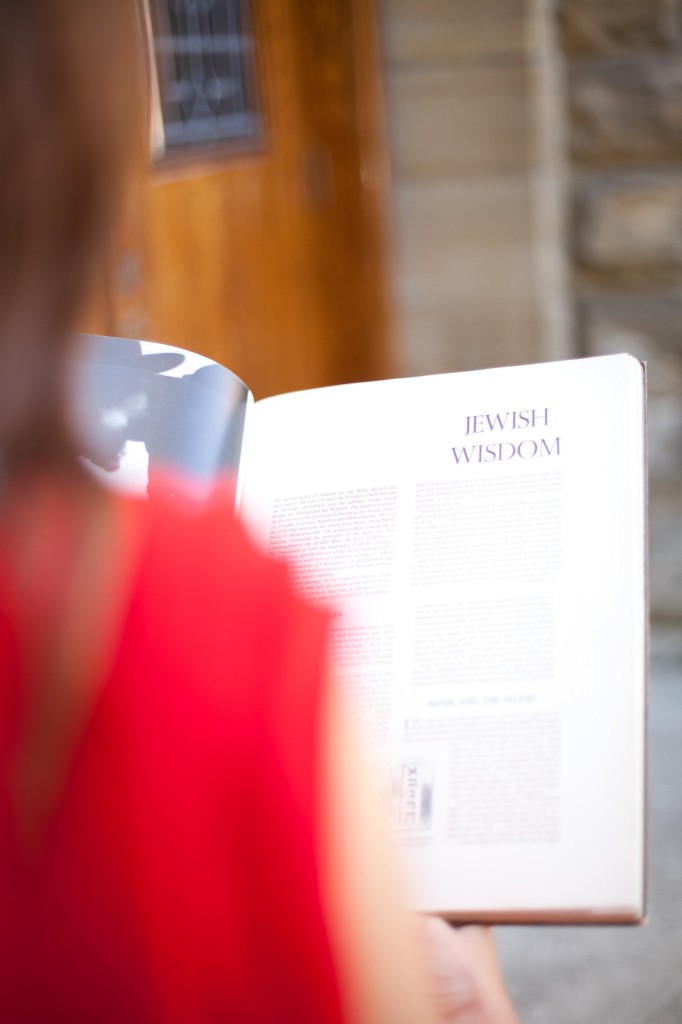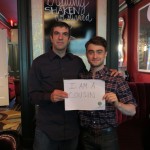This scene from my upcoming memoir Post-Traumatic Church Syndrome occurred Saturday, October 8, 2011, in Columbus, Ohio, where I visited a synagogue on Yom Kippur as part of my journey to overcome PTCS by experiencing thirty religions in the year before I turned thirty.
Excerpted from Chapter 12: Redemption
I skidded into the synagogue parking lot twenty minutes before service time, worried I might already be too late to snag a seat. But instead of the sea of cars I’d expected, policemen were setting up orange cones in an empty lot. I’d read that Yom Kippur—the Day of Atonement—is like the Christmas Eve of Judaism when it comes to attendance: everybody shows up for Grandma, whether they like it or not. Did I misread the start time?
“Happy New Year!” greeted a policeman when I exited the car.
“Happy New Year!” I responded, thinking he must be referring to the Jewish New Year, Rosh Hashanah, that had occurred ten days prior. Turning toward the synagogue door, I noticed a lady taking tickets from an older couple.
“Am I supposed to have a ticket?” I asked the policeman, who guffawed like I was joking.
“You forgot your ticket? Good luck getting past Dinah!”
Before you judge what happens next, please consider I was not only awake and out of bed on a Saturday morning; I was dressed in my best conservative attire and had driven thirty minutes. Dinah or no Dinah, I was not leaving without the full Yom Kippur experience. I surveyed my options.
- Option 1: Talk Dinah into letting me in. I mean, I sold stuff for a living! And I once talked my way into a sold-out event where best-selling author Elizabeth Gilbert was speaking. Surely I could sneak into a free[1] religious service. While I was thinking this, Dinah turned away two people.
- Option 2: Go in the back door. Policemen were everywhere; I did not want a full synagogue experience that began and ended with me in handcuffs.
- Option 3: Find an ally. This possibility presented itself in the form of a hobbling old man. He looked like he needed help walking; I needed help walking in. Perhaps we could come to an arrangement?
The elderly gentleman greeted me joyfully in Hebrew; I muttered something under my breath that might be construed as Hebrew before brightly adding, “Happy New Year!”
“So nice to see such a pretty young lady, coming to synagogue early!” he said, patting my arm. “G-d” forgive me, I took the opportunity to grab his elbow just in time for Dinah to see us.
“Moses!” she waved. “It’s so nice your granddaughter came with you!”
(Yom Kippur was the Day of Atonement; my slate was already pretty dirty—what’s a few more chalk marks before repenting?)
He didn’t hear; I kept quiet and flashed a demure smile that I hoped communicated “just another nice Jewish girl helping Grandpa.” He handed off his ticket while I pretended to fumble for mine.
“No ticket?” Dinah knit her brows.
“No,” I conceded miserably, sure I was about to be ousted.
“No problem,” she winked. “You take good care of your grandpa.”
I settled “Grandpa” in his seat, then followed Vinnie’s Rule, slipping into the fourth row on the right side directly behind an old lady—who immediately decamped as if my sitting had offended her. Now there was no one in front of me; who was I going to follow?
No one, apparently, because even the people behind me weren’t paying attention to the praying and reading happening at the front; everyone was just milling around, taking their time, chatting with friends on the way, apparently disregarding the rabbi’s speaking and singing. I assumed this was normal and began taking notes. Lovely stained glass—looks very much like a church, except with Hebrew writing everywhere…
Almost immediately, a gentleman pounced. “Put that pen away! What are you thinking, writing on Shabbat?!”
“Oops…” I tried to apologize, but he threw up his arms in a disgusted, “Kids these days—who needs ’em?” gesture.
A young guy—“A doctor!” he quickly informed me—plopped into the seat next to me: Did I come here often? Was I meeting my family later? Would I like to get married? He was joking, but there seemed to be a little desperation behind his glasses. He was a handsome fellow, if you’re into dark, wavy hair and liquid brown eyes.
“I’m already married,” I shifted uncomfortably, realizing I had forgotten my ring on the bathroom counter.
“Oh,” he laughed it off. “Too bad!”
“Can I ask you something, though…?”
“Joseph,” he supplied his name. “Sure.”
Confession time. “So…I’m not Jewish.” His brows shot up. “I thought today would be a good time to experience the synagogue, but the thing is, I’ve been so sick that I didn’t do research on Yom Kippur—or Judaism for that matter—beyond what I know from growing up.”
My former brand of Christianity maintained a complicated relationship with Judaism, sort of like a boyfriend they’d broken up with but couldn’t ever get rid of because they had a baby together. (That baby is Jesus, which makes God the baby-daddy.) It takes fancy theological river dancing to sidestep the “Are God’s chosen people in hell?” problem. This same set of Christians respects any Jew who plays for Team Jesus so much he even gets his own VIP title: “Completed Jew,” which is someone who is Jewish by heritage but Christian in belief and practice. This term always bothered me, like the Jew in question was only half a Jew before accepting Jesus into his heart, like in that famed movie scene—“[Jesus,] you complete me!”
“Cold or flu?” Joseph asked, all his doctor-y antennae up. He appeared to have heard nothing I said after the word “sick,” and I feared he might pull out a stethoscope and a tongue depressor from under his seat.
“Both,” I sidestepped the question. (I needed zero more doctors in my life, even cute ones.) “Anyway, I know Yom Kippur is the Day of Atonement, but what’s it really all about?”
It was Joseph’s turn to be uncomfortable. His collar appeared to be choking him. “Uh, I may not be the best person to ask. I’m Jewish but not religious.”
Hmmm. Maybe PTCS is really PTRS—Post-Traumatic Religion Syndrome?
Joseph cleared his throat. “I’ll do my best. Yom Kippur is a day of fasting where you repent of the old and promise to be better. It’s about making peace with God and others, but it’s also about staking a claim to the generations of people who came before you, to the religion of your people.”
I nodded. “Why are you here if you’re not religious?”
“Aside from the fact that my mother would kill me if I didn’t show?” He laughed wryly. “I guess for me, it’s about connecting with my family and my heritage. You can’t change the religion you were born with, so you might as well learn to celebrate it.”
“Especially if your mother will kill you if you don’t?”
“Yes! Especially then.” He caught a glimpse of someone behind me. “Speaking of my mother, there she is. I better get going.”
“Thanks, Joseph,” I said. “Happy New Year.”
I looked around the rapidly filling synagogue, wondering how many of the people were practicing Jews, and how many were culturally Jewish—here for Grandma, as it were. I also wondered how many of them had some form of PTRS. Joseph had said that if you can’t change your heritage you should celebrate it, but I felt a little jealous that he was able to claim the family and community aspects of his heritage without all the religious stuff. Joseph was still Jewish whether he practiced or not. If only I could be Christian-ish, I thought.
The idea was so big that it knocked my mind out of the way of my feet, which propelled me to the ladies’ restroom. I locked myself in a stall and took out my pen and journal:
What if instead of constantly warring with my religious past, I think of Christianity as my country of origin? Could I claim everything helpful as my heritage, my birthright, and get rid of the rest? Could Christianity be the bedrock of my transformation instead of something to overcome?
I sat back. I didn’t know the answers to all these questions, but I knew this was a Day of Atonement (even if I was in a bathroom stall breaking the Sabbath rules).
To me, atonement meant redemption: the redemption of everything bad for good. Christianish.
I tested my Christianish theory by thinking about atonement in the parlance of my childhood: Redemption is like exchanging beauty for ashes, gladness for mourning.
These words from Isaiah 61 were the best ones I knew to talk about atonement, but ten minutes prior I wouldn’t have used them because they were too churchy, too PTCS-triggering. But now…I remembered something Elizabeth Gilbert had said at that event I talked my way into. “Take whatever works from wherever you can find it, and you keep moving toward the light.”
Beauty for ashes.I thought the words of the Bible verse again, mentally moving toward the light.
It felt awkward, like a baby colt trying to walk.
But it sure as hell didn’t hurt.
[1] I discovered much later that it was not a free event; many synagogues charge money for a seat for the High Holy Days. My apologies to the rabbi.
Like Reba on Facebook Follow @RebaRiley on Twitter

http://kellystjamesphotoblog.com/












